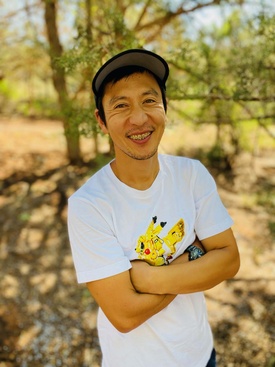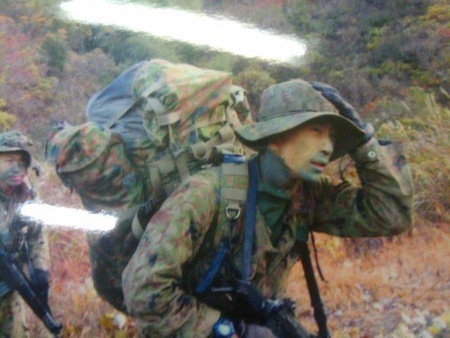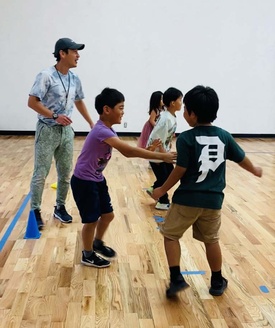I can't protect Japan if I stay in Japan - In 2011, I left the Self-Defense Forces and volunteered to join the U.S. military
When I heard from an acquaintance of mine, who serves as the PTA president at a local school in Orange County, that "We are preparing to hold a half-day sports day at our school. The person in charge is a Japanese former member of the Self-Defense Forces," I suddenly became interested. I wanted to know why he left the Self-Defense Forces and came to the United States, and why he is now teaching physical education, so I was introduced to him by my acquaintance and conducted an online interview.
The former Self-Defense Forces officer involved in promoting physical education classes and athletic meets is named Hiroshi Kawaguchi. When I first asked him about his background in Japan and the reason he came to the United States, he told me the following story.
"After graduating from high school in Japan, I joined the Self-Defense Forces without any particular goal in mind, but I was influenced by the classmates I met there and felt a desire to take on new challenges. First, when I got through the hurdle of joining the Ranger Unit, I developed an admiration for the paratroopers who descend from the sky, and after much effort, I finally achieved my dream of joining the 1st Airborne Brigade. In the Self-Defense Forces, I was passionate about my mission to protect Japan.
At that time, I met a Japanese man who was a US Marine through social media. Wanting to meet him and hear his story, I flew to North Carolina where the base was located. I was greatly influenced by him and came to the conclusion that 'America is the world's police. To protect Japan, I cannot stay in Japan,' so the day after I returned to Japan, I told my superior that I would be quitting the Self-Defense Forces. They didn't let me quit right away, so I left the military six months later, and three months later I came to America, first on a student visa.
Shifting focus to early childhood education
Kawaguchi's desire to join the U.S. military and protect Japan from the outside was pure. However, reality did not respond to his pure desire.
"After coming to the US, I found out that at the time, under the Obama administration, you couldn't join the US military without permanent residency. People would often tell me that I could have researched (the enlistment requirements) from Japan, but I had a solid track record in the Japanese Self-Defense Forces for eight years, so I felt like it would be fine. However, after learning the reality, I realized that as a 27-year-old who came to the US, there was an age limit of 27 for rejoining the Self-Defense Forces (on returning to Japan), and I was just about to pass that age."
At the time, Kawaguchi was attending a language school from his homestay in Irvine, California. He had become interested in early childhood education while working with his host family's children, and he recalls that he changed his mind about volunteering for the U.S. military and decided to major in early childhood education at college.
After graduating from college, she was hired as a physical education teacher at a Japanese Montessori school on an OPT (Post-College Practical Training Visa). She was impressed by the Montessori educational philosophy of "drawing out children's interest" at the school, so she attended a Montessori educational institution, obtained a teaching qualification, and began to teach not only physical education but also as a homeroom teacher. By the time she was sponsored by the school and obtained permanent residency, she had completely changed direction and decided that her specialty would be education.
"While teaching children at the Montessori school, my personal way of thinking has undergone a 180-degree change. When I was in the Self-Defense Forces, I thought that I had to protect my country for the sake of my loved ones, even if it meant losing my own life. However, I finally realized that if you lose your life, in the end you can't do anything, you can't help anyone. Furthermore, I now realize that my own life is important in order to guide the children who will represent the future."
I want them to experience sports day.
For Kawaguchi, his life thus far can be divided into two distinct periods: "the period when he served in the Self-Defense Forces and the period when he applied to join the U.S. military" and "the period when he made a major shift to early childhood education and devoted himself to educating children at a Montessori school." And now, in 2020, he has moved on to the next phase.
"I married Aya, a kindergarten teacher I met at the school where I was working, and we left school together to start our own business. It may sound strange for me to say this, but my PE classes were so popular with the children that whether or not they could take classes was determined by lottery. I still use the Montessori method of motivating children by piqued their interest, but I wanted more children (outside of school) to receive my PE instruction. I also wanted to spread the word about PE classes, which are not very active in America, and the sports day that is the culmination of these classes, in America, so I decided to go independent."
It is true that due to lack of budget, art, music and physical education classes are not very well-developed in local American schools.
"Japanese children gain experience in a wide range of different sports in their physical education classes, including track and field, ball games, gymnastics, and even marathons in the winter. In contrast, in American schools, students jump straight into club activities in their own specialized sports in middle and high school, without ever trying out a variety of different sports.
One sixth grade boy was a star in American football, but when they tried to get him to do mat exercises, he couldn't do a front flip. What happened was that he couldn't do it because he'd never done it before, and he didn't want to try because he was afraid of failing. We want American children to experience Japan's physical education culture, where they can try a wider variety of sports, rather than moving straight into specialized sports."
H&A Learning Adventure, which Kawaguchi and his wife Aya launched, is a company that coordinates physical education classes that fit the school curriculum, and the core of its activities is "education delivery," which involves holding classes at schools and instructing children at sports facilities. As mentioned above, they hold Japanese-style sports days, provide exercise instruction for adults as well as children, and have also launched a business to support studying abroad, as they wanted as many people as possible to study in America, after coming to America and finding their lifelong goal.
Finally, when I asked Kawaguchi about his identity, he immediately replied, "I'm Japanese," and after the interview ended, he emailed me, "I'd like to call myself a Japanese who has made a big turnaround." He was unable to join the U.S. military, which was his goal when he came to America, but he found a new path and turned his career around, and he also turned his values around dramatically.
* H&A Learning Adventure homepage
© 2024 Keiko Fukuda








